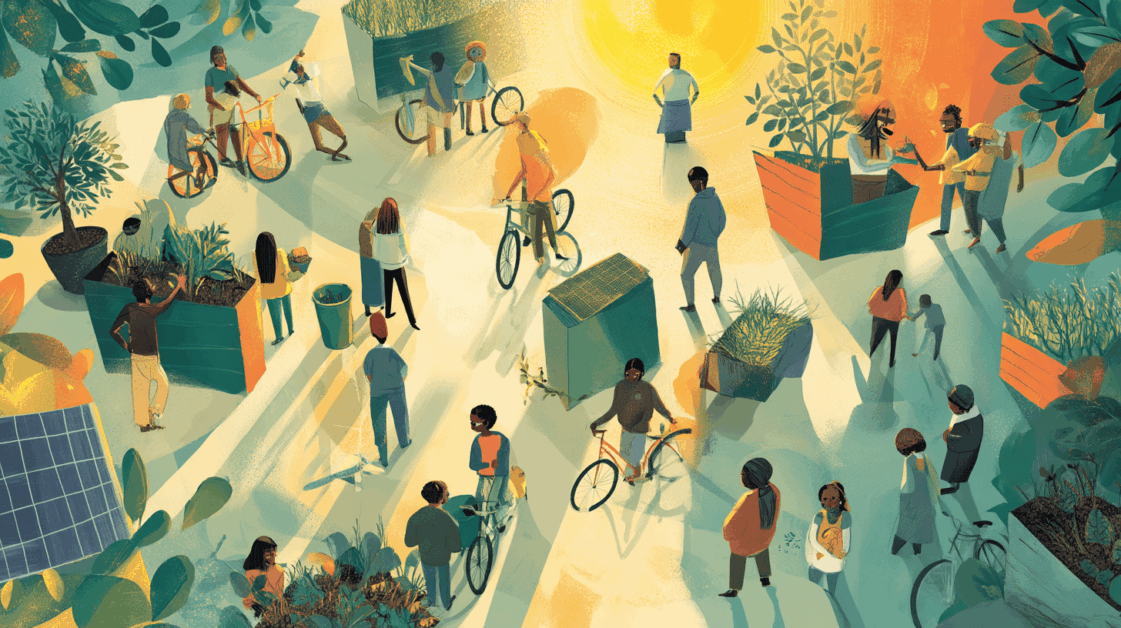A sustentabilidade se tornou uma palavra-chave em nossa sociedade, especialmente à medida que enfrentamos desafios ambientais crescentes.
Desde a mudança climática até a biodiversidade em declínio, a necessidade de práticas sustentáveis nunca foi tão crucial. Mas o que significa realmente viver de uma maneira sustentável e como podemos aplicar isso em nosso cotidiano? Este post explorará a importância da sustentabilidade em nossas vidas diárias e fornecerá dicas práticas para que todos nós possamos fazer a nossa parte.
What is Sustainability?
Sustainability is the practice of meeting the needs of the present without compromising the ability of future generations to meet their own needs. It involves three main pillars: environmental, social and economic. A balance between these three aspects is essential to ensuring a healthy and viable future for our planet.
Why is Sustainability Important?
With the world’s population growing and natural resources becoming increasingly overconsumed, we are at a critical point in our relationship with the environment. Here are some reasons why sustainability should be at the heart of our daily actions:
– Climate Change: The burning of fossil fuels, deforestation and industrial activities release greenhouse gases, leading to global warming. Sustainable measures help mitigate these impacts. – Resource Conservation: Sustainable practices aim to preserve natural resources and energy, ensuring that they remain available for future generations. – Health and Wellbeing: A healthy environment leads to a better quality of life. Reducing pollution and protecting ecosystems promotes health for both humans and wildlife. – Social Justice: Sustainability also encompasses social issues, ensuring that communities have access to the same opportunities for development and a dignified life.
Implementing Sustainable Practices in Your Daily Life
Now that we understand why sustainability is so important, let’s explore some actions we can integrate into our daily routines to promote a more harmonious relationship with the environment.
Reduce, Reuse and Recycle
: Adopting the 3Rs concept is one of the most effective ways to promote sustainability. Reducing consumption of goods, reusing products and recycling materials can drastically reduce the amount of waste we generate. This practice helps to conserve energy and reduces pollution.
Buy Locally
: Choosing local and organic produce not only supports the local economy, but also reduces carbon emissions associated with shipping goods. Plus, local foods tend to be fresher and more nutritious.
Save Energy
: Small changes in the way we use energy can result in big savings and reduce greenhouse gas emissions. Suggestions include: – Replacing incandescent light bulbs with LEDs. – Turning off electronic devices when not in use. – Using energy-efficient appliances.
Sustainable Transport
: Whenever possible, use modes of transportation that have a lower impact on the environment, such as cycling, public transportation, or carpooling. This practice not only reduces carbon emissions, but also improves air quality.
Practice Urban Agriculture
: If you have the space at home, consider growing your own herbs and vegetables. Not only does this ensure that you have fresh produce, but it also cuts down on packaged goods.
Preserve Water
: Water is a precious and scarce resource in many parts of the world. Implementing conservation practices, such as taking shorter showers, turning off the tap when brushing your teeth, and collecting rainwater for irrigation, can make a big difference.
Participate in Local Initiatives
: Many cities have park cleanup programs or tree planting campaigns. These community activities not only help improve urban spaces, but they also connect you with others who share similar environmental concerns.
Educate Yourself and Educate Others
: Education is a powerful tool in promoting sustainability. Educate yourself about environmental issues and share this knowledge with friends and family. The more people who are aware of the problems and solutions, the greater the positive impact will be.
Sustainability in Our Structures and Cities
In addition to personal practices, sustainability should be a priority at the community and government levels. Cities around the world are taking steps to become more sustainable, including:
– Ecological Buildings: Buildings that use sustainable technologies, such as solar panels, water reuse systems and recycled materials, minimize environmental impact. – Green Spaces: Planting trees and creating urban parks not only improves air quality, but also provides healthy recreational spaces for the community. – Renewable Energy: Many cities are investing in renewable energy sources, such as solar and wind, to reduce dependence on fossil fuels.
Conclusion
Implementing sustainability into our daily lives is a fundamental step towards ensuring that we leave a viable and healthy world for future generations. Individual actions, when combined, have the power to create a significant impact. By adopting sustainable practices, we are not only taking care of our planet, but also promoting a more conscious and balanced lifestyle. Now is our turn to take action and make a difference. Share this article and inspire others to join the sustainability cause!

